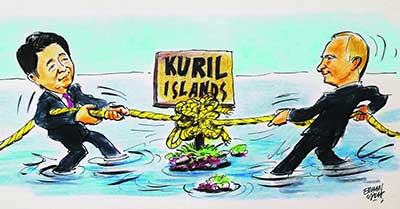Relevance: GS-2 : India and its neighborhood- relations.
Key Phrases: Territorial Dispute, Sea of Okhotsk , Japan-Soviet Joint Declaration , Northern Territories , Yalta Agreement , San Francisco Treaty ,Russia China Alliance ,Habitual Offender of International Law.
Why in News ?
- Japan’s Foreign Minister has recently stated that Russia had “occupied” the southern part of the Kuril Islands, thereby violating international law.
- Additionally, Japan’s recent Diplomatic Bluebook for 2022 described the Kuril Islands as being under Russia’s “illegal occupation”.
Background
- Kuril islands are under dispute as both Moscow and Tokyo claim sovereignty over them but they have been under Russian control since the end of World War II.
- In 1956, it was suggested that two of the four islands be returned to Japan once a peace treaty was signed.
- However, persisting differences prevented the signing of a peace treaty though the two countries signed the Japan-Soviet Joint Declaration, which restored diplomatic relations.
- The Soviet Union had seized the islands at the end of World War II and by 1949 had expelled its Japanese residents.
- Tokyo claims that the disputed islands have been part of Japan since the early 19th century.
What are the Kuril Islands/ Northern Territories?
- These are a set of four islands situated between the Sea of Okhotsk and the Pacific Ocean near the north of Japan's northernmost prefecture, Hokkaido in East Asia.
- They range from northeast to southwest about a mile away.
- They are under the jurisdiction of the Russian Federation and are part of the Sakhalin Territory, but Japan claims two large southern islands,i.e., the islands of Shikotan and Habomai, also known as the “Kuril Islands”.
- Japan calls the Kuril islands as Northern Territories and Russia as the South Kurils.
What are The Claims Asserted Over the Disputed Islands by Russia ?
- Russia claims the Yalta Agreement (1945) and the Potsdam Declaration (1945) as proof of its sovereignty
- The San Francisco Treaty of 1951 is legal evidence that Japan had acknowledged Russian sovereignty over the islands.
- Under Article 2 of the treaty, Japan had renounced all right, title and claim to the Kuril Islands.

What are the Claims Asserted Over the Disputed Islands by Japan ?
- According to Tokyo, Japan’s sovereignty over the islands is confirmed by
several treaties-
- Shimoda Treaty of 1855
- 1875 Treaty for the exchange of Sakhalin for the Kuril Islands (Treaty of St. Petersburg).
- Portsmouth Treaty of 1905 signed after the Russo-Japanese war of 1904-05 which Japan had won.
- However, Japan argues that the San Francisco Treaty cannot be used here as the Soviet Union never signed the peace treaty.
- In fact, Japan and Russia are technically still at war because they have not signed a peace treaty after World War II.
- In 1956, during Japanese Prime Minister Ichiro Hatoyama’s visit to the Soviet Union, it was suggested that two of the four islands would be returned to Japan once a peace treaty was signed.
- However, persisting differences prevented the signing of a peace treaty though the two countries signed the Japan-Soviet Joint Declaration, which restored diplomatic relations between the two nations.
- The Soviet Union later hardened its position, even refusing to recognise that a territorial dispute existed with Japan.
- It was only in 1991 during Mikhail Gorbachev’s visit to Japan that the USSR recognised that the islands were the subject of a territorial dispute.
Have There been Attempts at Resolution?
- Since 1991, there have been many attempts to resolve the dispute and sign a peace treaty.
- The most recent attempt was under Prime Minister Shinzo Abe when Joint Economic Development of the disputed islands was explored.
- In fact, both countries had agreed to have bilateral negotiations based on the 1956 Japan-Soviet Joint Declaration.
- Russia was even willing to give back two islands, the Shikotan Island and the Habomai islets, to Japan after the conclusion of a peace treaty as per the 1956 declaration.
- Japan’s attempt to improve ties with Russia was driven by its need to diversify energy sources and Russia by its need to diversify its basket of buyers and bring in foreign investments.
- But nationalist sentiments on both sides prevented resolution of the dispute.
Why Has the Dispute Resurfaced Again ?
- The Russian invasion of Ukraine seems to have brought to the forefront some other disputes that Russia has with the West’s allies.
- Soon after the Russian invasion of Ukraine, Japan made its unhappiness with Russia clear, saying that Russia had “occupied” the southern part of the Kuril Islands, thereby violating international law.
- Japan has been among the most steadfast of Western allies in denouncing Russian aggression and punishing it with sanctions.
- Japan has probably been spurred by its fears of a Russia-China alliance as Japan itself has territorial disputes and an uneasy history with China.
- Japan might have felt that this is a good opportunity to further isolate Russia and paint it as a habitual offender of international law.
- Finally, Tokyo might have been prompted to take this position as it feels that the invasion of Ukraine proves that getting back the Kuril Islands is a lost cause.
Conclusion :
- This is the first time in about two decades that Japan has used this phrase to describe the dispute over the Kuril Islands.
- Japan had been using softer language since 2003, saying that the dispute over the islands was the greatest concern in Russia-Japan bilateral ties.
- Japan’s policy shift on the Kuril Islands will only embitter bilateral relations with Russia while advancing the possibility of its two neighbours, China and Russia, coming together against it.
Source: The Hindu
Mains Question :
Q. What are Kuril Islands ? What are the claims asserted by Russia and Japan over the disputed islands and why has the dispute resurfaced again ? (250 words ).








